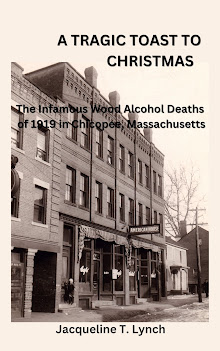Three of the books covered have ties to western Massachusetts. One, By Your Leave, Sir, by Lt. (j.g.) Hellen Hull Jacobs describes the Navy training of the first WAVES at Smith College in Northampton. That book, and its locales of the college and of Hotel Northampton where the first female officers were billeted, I've already discussed here in this previous post.
A similar experience awaited another young woman just across the river from Northampton in the western Massachusetts town of South Hadley, where Mount Holyoke College, another women’s college, was the site of training for WAVES as well as for women Marines. The character of Priscilla Warner has chosen to become a Marine.
Lady Leatherneck was written by First Lieutenant Barbara A. White, MCWR (1921-2000), who graduated from Bates College, Lewiston, Maine, and taught for six months before joining the Women Marines, among the first to enlist. At the time of her book’s publication, she was stationed at Parris Island, South Carolina, an adjutant of “a large men’s battalion.” She later married fellow Marine officer Howe Morris and returned to her teaching career after the war, obtaining master’s degrees from Boston University and the University of Southern Maine.
Lady Leatherneck is similar to By Your Leave, Sir, in that the author is herself a woman in the service, in this case, the Marine Corps Women’s Reserve, and also is based on the author’s own real-life experiences.
Unlike the character of Becky of By Your Leave, Sir, who is a Southerner adjusting to a New
England winter, the protagonist in Lady Leatherneck (the term
“leatherneck” is an old slang word for a Marine), Priscilla Warner, is a native
Bostonian, and Massachusetts is home, and a place she longs to return when the
war is over. She’s on familiar ground.
Priscilla is a recent college graduate and has spent the last few months teaching, and lives with her widowed mother. Her older brother, Steve, a Marine, was captured by the Japanese after the fall of Bataan in the Philippines, and it has been several months since she and her mother have had any word of him.
Walking through the streets of Boston, Priscilla spots a recruiting office and
is inspired to join not only by her brother’s sacrifice but of boys she knew in
college who were reported wounded or killed.
Priscilla must go through interviews, physical exams, and a great deal of soul-searching. Her mother wonders what the future will be for her in the Marines, especially in light of giving up a good teaching job.
She wants to replace a man for combat, in this case, replacing her brother Steve in the prison camp. Her training period is to last two months at Mount Holyoke College, and like the WAVES and the WACs (Women's Army Corps), they will perform duties as typists, stenographers, telephone operators, bakers and cooks, and a variety of other administrative and technical support tasks.
She is sworn in, and for the next month, concludes her teaching job and waits for orders. Finally, she takes the train a just little way west to the Connecticut River Valley and South Hadley, where she will receive her training at Mount Holyoke College, like Smith College, one of the preeminent women’s colleges in the country. She meets her fellow officer candidates, and, like By Your Leave, Sir, much of her Marine experience seems to have a sorority-like aspect.
More tests, and classes, and learning to call a floor a “deck,” stairs a “ladder,” and the bathroom the “head.” Her platoon trains with a group of WAVES and she is confounded as the Navy cadence is different from the Marine Corps. They have a course in aircraft recognition. The training experience in this novel, however, is given short shrift in comparison to the detailed experience in By Your Leave, Sir. Priscilla receives her commission and is posted to Camp Lejeune, North Carolina. There she will find romance and adventure there and at other bases in California.
Another tie to western Massachusetts is the author Dorothy Deming, R.N. (1893-1972), who wrote Penny Marsh and Ginger Lee, Wartime Nurses, which she dedicated “To The Army Nurses of Bataan.”
Ms. Deming earned her Bachelor of Arts degree at Vassar College in 1914; and graduated from the Presbyterian Hospital School of Nursing in New York City in 1920. She became the director of the Holyoke, Massachusetts, Visiting Nurse Association in 1924, and wrote extensively on nursing, both non-fiction and fiction. Her books for girls were a window into the career of nursing, and her most popular series was the Penny Marsh series.
Penny Marsh and Ginger Lee, Wartime Nurses follows the civilian and military nursing of the two main characters. Interestingly, the book alternates chapters between the two friends: one chapter to Ginger Lee, and the next to Penny Marsh. Each tells a different aspect of wartime nurses. Ginger is an Army nurse serving overseas, and Penny nurses on the home front.
Next week, I'll post on two boys' adventure books that visit the submarine base at New London, Connecticut.
Children's Wartime Adventure Novels is available in eBook directly from my online store here.
It is also available in eBook from Barnes & Noble, Apple, and a wide variety of online shops here.
It is also available in eBook, paperback, and hardcover from Amazon here.
******************
Jacqueline T. Lynch is the author of The Ames Manufacturing Company of Chicopee, Massachusetts - A Northern Factory Town's Perspective on the Civil War;
Comedy and Tragedy on the Mountain: 70 Years of Summer Theatre on Mt. Tom, Holyoke, Massachusetts;
A Tragic Toast to Christmas -- The Infamous Wood Alcohol Deaths of 1919 in Chicopee, Mass.; as well as books on classic films and several novels. Her Double V Mysteries series is set in New England in the early 1950s.
TO JOIN HER READERS' GROUP - follow this link for a free book as a thank-you for joining.












No comments:
Post a Comment